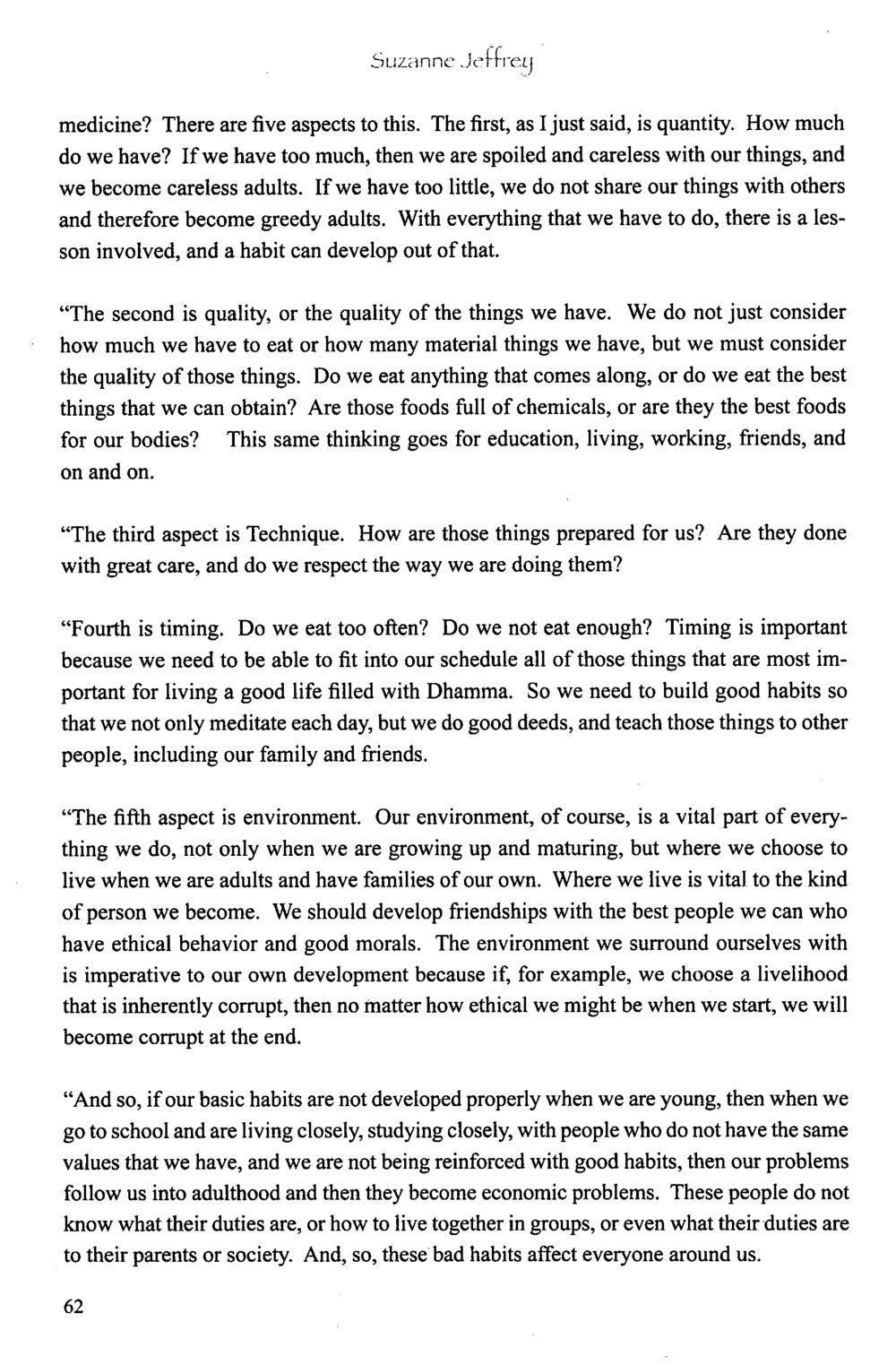Five Aspects of Personal Development : หน้า 66/164
The Meeting with a Dhamma Master : หน้า 66/164 Explore the five essential aspects of personal development: quantity, quality, technique, timing, and environment.
0 ครั้ง

สรุปเนื้อหา
เนื้อหานี้กล่าวถึงห้าแง่มุมสำคัญในการพัฒนาตนเอง ได้แก่ จำนวน (หากมีมากเกินไปอาจทำให้เราหยาบกระด้าง, หากมีน้อยเกินไปอาจทำให้เราโลภ) คุณภาพ (พิจารณาคุณภาพของสิ่งที่เรามี เช่น อาหาร การศึกษา) เทคนิค (วิธีการที่เราเตรียมสิ่งต่างๆ) เวลา (การกินในเวลาที่เหมาะสม) และสภาพแวดล้อม (การเลือกเพื่อนและสภาพแวดล้อมที่มีผลต่อพัฒนาการ) ซึ่งทั้งหมดนี้มีส่วนสำคัญในการพัฒนาตนเองและสุขภาพจิตที่ดี และหากเราขาดการพัฒนานิสัยที่ดีตั้งแต่เด็ก ปัญหาเหล่านี้อาจตามมาสู่วัยผู้ใหญ่และเกิดปัญหาเศรษฐกิจตามมาได้.
หัวข้อประเด็น
-จำนวน
-คุณภาพ
-เทคนิค
-เวลา
-สภาพแวดล้อม
ข้อความต้นฉบับในหน้า
Suzanne Jeffrey
medicine? There are five aspects to this. The first, as I just said, is quantity. How much do we have? If we have too much, then we are spoiled and careless with our things, and we become careless adults. If we have too little, we do not share our things with others and therefore become greedy adults. With everything that we have to do, there is a lesson involved, and a habit can develop out of that.
“The second is quality, or the quality of the things we have. We do not just consider how much we have to eat or how many material things we have, but we must consider the quality of those things. Do we eat anything that comes along, or do we eat the best things that we can obtain? Are those foods full of chemicals, or are they the best foods for our bodies? This same thinking goes for education, living, working, friends, and on and on.
“The third aspect is Technique. How are those things prepared for us? Are they done with great care, and do we respect the way we are doing them?
“Fourth is timing. Do we eat too often? Do we not eat enough? Timing is important because we need to be able to fit into our schedule all of those things that are most important for living a good life filled with Dhamma. So we need to build good habits so that we not only meditate each day, but we do good deeds, and teach those things to other people, including our family and friends.
“The fifth aspect is environment. Our environment, of course, is a vital part of everything we do, not only when we are growing up and maturing, but where we choose to live when we are adults and have families of our own. Where we live is vital to the kind of person we become. We should develop friendships with the best people we can who have ethical behavior and good morals. The environment we surround ourselves with is imperative to our own development because if, for example, we choose a livelihood that is inherently corrupt, then no matter how ethical we might be when we start, we will become corrupt at the end.
“And so, if our basic habits are not developed properly when we are young, then when we go to school and are living closely, studying closely, with people who do not have the same values that we have, and we are not being reinforced with good habits, then our problems follow us into adulthood and then they become economic problems. These people do not know what their duties are, or how to live together in groups, or even what their duties are to their parents or society. And, so, these bad habits affect everyone around us.
62
Tags : #พัฒนาตนเอง #คุณภาพ #เทคนิค #เวลา #สภาพแวดล้อม
หน้าหนังสือทั้งหมด

1

2

3

4

5

6

7

8

9

10

11

12

13

14

15

16

17

18

19

20

21

22

23

24

25

26

27

28

29

30

31

32

33

34

35

36

37

38

39

40

41

42

43

44

45

46

47

48

49

50

51

52

53

54

55

56

57

58

59

60

61

62

63

64

65

66

67

68

69

70

71

72

73

74

75

76

77

78

79

80

81

82

83

84

85

86

87

88

89

90

91

92

93

94

95

96

97

98

99

100

101

102

103

104

105

106

107

108

109

110

111

112

113

114

115

116

117

118

119

120

121

122

123

124

125

126

127

128

129

130

131

132

133

134

135

136

137

138

139

140

141

142

143

144

145

146

147

148

149

150

151

152

153

154

155

156

157

158

159

160

161

162

163

164
หนังสือที่เกี่ยวข้อง
Load More
